人教版(2024)七年级下册 Unit8 Once upon a Time Section A (3a-3d) 语法课件(共14张PPT)
文档属性
| 名称 | 人教版(2024)七年级下册 Unit8 Once upon a Time Section A (3a-3d) 语法课件(共14张PPT) |
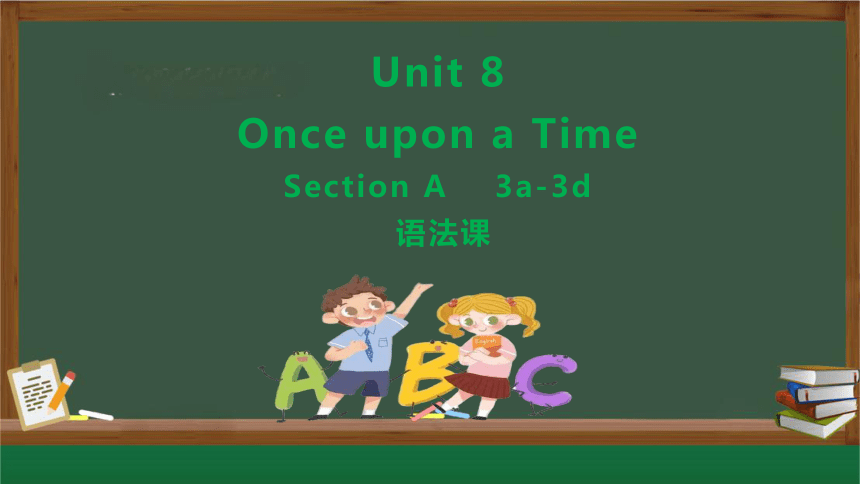
|
|
| 格式 | pptx | ||
| 文件大小 | 4.3MB | ||
| 资源类型 | 教案 | ||
| 版本资源 | 人教版 | ||
| 科目 | 英语 | ||
| 更新时间 | 2025-07-14 00:00:00 | ||
图片预览

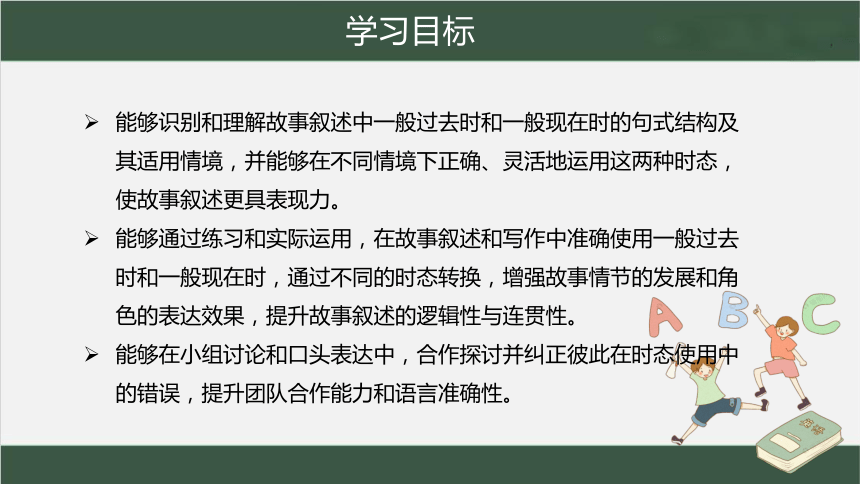
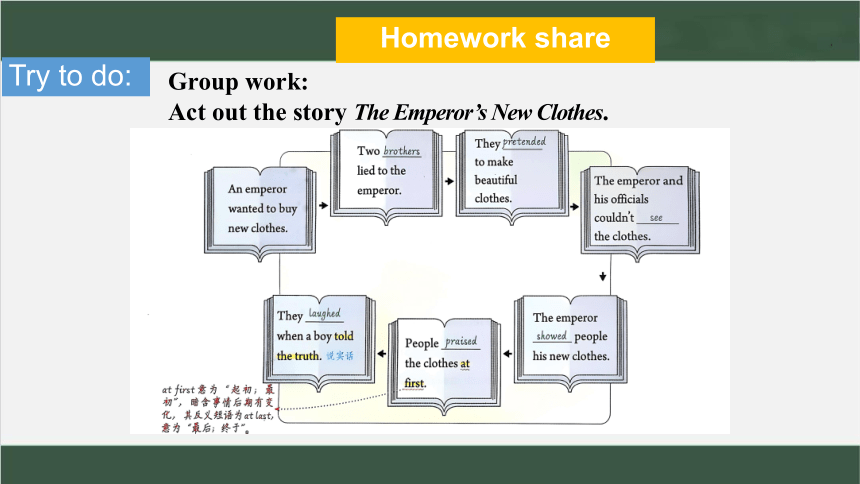
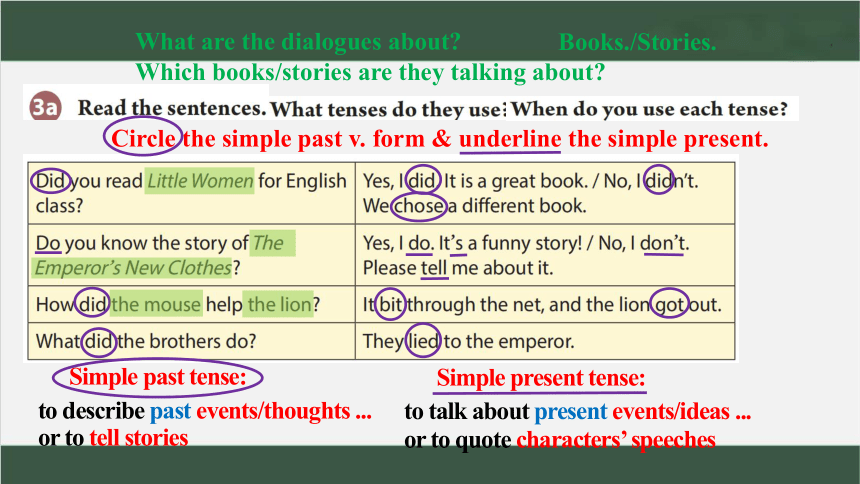
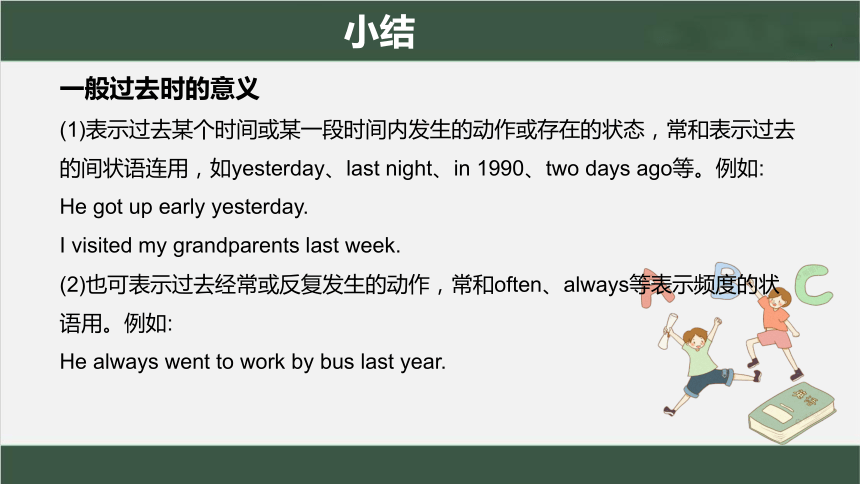
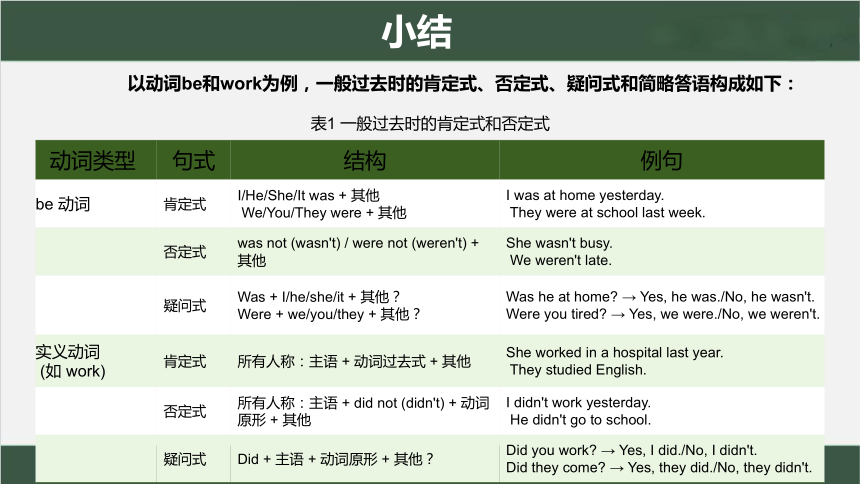
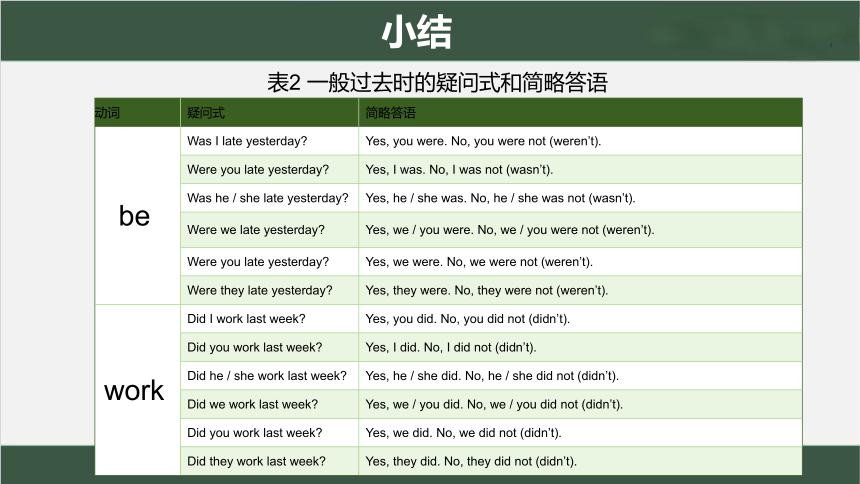
文档简介
(共14张PPT)
Unit 8
Once upon a Time
Section A 3a-3d
语法课
学习目标
能够识别和理解故事叙述中一般过去时和一般现在时的句式结构及其适用情境,并能够在不同情境下正确、灵活地运用这两种时态,使故事叙述更具表现力。
能够通过练习和实际运用,在故事叙述和写作中准确使用一般过去时和一般现在时,通过不同的时态转换,增强故事情节的发展和角色的表达效果,提升故事叙述的逻辑性与连贯性。
能够在小组讨论和口头表达中,合作探讨并纠正彼此在时态使用中的错误,提升团队合作能力和语言准确性。
Homework share
Try to do:
Group work:
Act out the story The Emperor’s New Clothes.
Simple past tense:
to describe past events/thoughts ...
or to tell stories
Simple present tense:
to talk about present events/ideas ...
or to quote characters’ speeches
What are the dialogues about
Books./Stories.
Which books/stories are they talking about
Circle the simple past v. form & underline the simple present. tense.
小结
一般过去时的意义
(1)表示过去某个时间或某一段时间内发生的动作或存在的状态,常和表示过去的间状语连用,如yesterday、last night、in 1990、two days ago等。例如:
He got up early yesterday.
I visited my grandparents last week.
(2)也可表示过去经常或反复发生的动作,常和often、always等表示频度的状语用。例如:
He always went to work by bus last year.
动词类型 句式 结构 例句
be 动词 肯定式 I/He/She/It was + 其他
We/You/They were + 其他 I was at home yesterday.
They were at school last week.
否定式 was not (wasn't) / were not (weren't) + 其他 She wasn't busy.
We weren't late.
疑问式 Was + I/he/she/it + 其他?
Were + we/you/they + 其他? Was he at home → Yes, he was./No, he wasn't.
Were you tired → Yes, we were./No, we weren't.
实义动词
(如 work) 肯定式 所有人称:主语 + 动词过去式 + 其他 She worked in a hospital last year.
They studied English.
否定式 所有人称:主语 + did not (didn't) + 动词原形 + 其他 I didn't work yesterday.
He didn't go to school.
疑问式 Did + 主语 + 动词原形 + 其他? Did you work → Yes, I did./No, I didn't.
Did they come → Yes, they did./No, they didn't.
小结
以动词be和work为例,一般过去时的肯定式、否定式、疑问式和简略答语构成如下:
表1 一般过去时的肯定式和否定式
动词 疑问式 简略答语
be Was I late yesterday Yes, you were. No, you were not (weren’t).
Were you late yesterday Yes, I was. No, I was not (wasn’t).
Was he / she late yesterday Yes, he / she was. No, he / she was not (wasn’t).
Were we late yesterday Yes, we / you were. No, we / you were not (weren’t).
Were you late yesterday Yes, we were. No, we were not (weren’t).
Were they late yesterday Yes, they were. No, they were not (weren’t).
work Did I work last week Yes, you did. No, you did not (didn’t).
Did you work last week Yes, I did. No, I did not (didn’t).
Did he / she work last week Yes, he / she did. No, he / she did not (didn’t).
Did we work last week Yes, we / you did. No, we / you did not (didn’t).
Did you work last week Yes, we did. No, we did not (didn’t).
Did they work last week Yes, they did. No, they did not (didn’t).
表2 一般过去时的疑问式和简略答语
小结
一般过去时的特殊疑问句结构:
①疑问词+was/were+主语+其他
②疑问词+did+主语+动词原形+其他
肯定回答:
主语+动词过去式十其他
否定回答:
主语+did not+动词原形+其他
一般过去时的一般疑问句结构:
①Was/Were+主语+其他
② Did+主语+动词原形+其他
肯定回答
① Yes,主语+was/were.
② Yes,主语+did
否定回答
①No,主语+wasn't/weren't
② No,主语+didn't.
小结
类别 构成方法 例词与读音
一般情况 直接加-ed look—looked/lukt/
play—played/pleid/
start—started/ stɑ t d/
以e结尾的动词 加-d hope—hoped/h pt/
live—lived/l v l/
use—used/ju zd/
以重读闭音节结尾的动词,末尾只有一个辅音字母 双写词尾的辅音字母,再加-ed step—stopped/st pt/
plan—planned/pl nd/
以辅音字母加y结尾的动词 变y为i,再加-ed study—studied/ st dt l/
carry—carried/ k r d/
worry—worried/wɑ rd/
表3 动词过去式的构成与读音
小结
动词过去式的构成分为规则与不规则两类。规则动词过去式一般有四种构成方式其读音规则一般是:清辅音后面读作/t/,浊辅音和元音后面读作/d/,/t/和/d/后面读作/Id/。
不规则动词的变化规则见课后不规则动词表
The cat got out quickly through the window.
There were beautiful flowers all over the park.
Peter smiled when he saw his friend.
The officials pretended to like the king’s idea.
Did the artist praise the girl’s painting
小试牛刀
wanted
am
spoke
told
have
watched
know
agreed
cried
broke
小试牛刀
be+ving/v-ed/v(s/es)
How can we decide verb forms
What verb forms here
Times expressions;
Other verb forms in the context;
√
√
√
√
√
√
√
√
√
√
√
√
Who’s the writer
√
√
lets ; let --let
Homework: Find out what the story is about.
What tense do we use
to tell a story
Tip: mind the tense in the speech.
What can you learn from the story
Homework: What’s the name of the story
Rome is not built in one day.
What did the artist do in the past few months
v-ed
v(s/es);
be+ving
to describe past activities or events
to quote characters’ speeches
asked
give
answered
grew
is
painted
like
smiled
took
said
=everywhere
In the speeches, are all the sentences in simple present tense Why
Practice makes perfect.
Homework
Must do:
Write down your story description.
Try to do:
Think of a name for the story in 3c.
Find out what two picture are about.
Unit 8
Once upon a Time
Section A 3a-3d
语法课
学习目标
能够识别和理解故事叙述中一般过去时和一般现在时的句式结构及其适用情境,并能够在不同情境下正确、灵活地运用这两种时态,使故事叙述更具表现力。
能够通过练习和实际运用,在故事叙述和写作中准确使用一般过去时和一般现在时,通过不同的时态转换,增强故事情节的发展和角色的表达效果,提升故事叙述的逻辑性与连贯性。
能够在小组讨论和口头表达中,合作探讨并纠正彼此在时态使用中的错误,提升团队合作能力和语言准确性。
Homework share
Try to do:
Group work:
Act out the story The Emperor’s New Clothes.
Simple past tense:
to describe past events/thoughts ...
or to tell stories
Simple present tense:
to talk about present events/ideas ...
or to quote characters’ speeches
What are the dialogues about
Books./Stories.
Which books/stories are they talking about
Circle the simple past v. form & underline the simple present. tense.
小结
一般过去时的意义
(1)表示过去某个时间或某一段时间内发生的动作或存在的状态,常和表示过去的间状语连用,如yesterday、last night、in 1990、two days ago等。例如:
He got up early yesterday.
I visited my grandparents last week.
(2)也可表示过去经常或反复发生的动作,常和often、always等表示频度的状语用。例如:
He always went to work by bus last year.
动词类型 句式 结构 例句
be 动词 肯定式 I/He/She/It was + 其他
We/You/They were + 其他 I was at home yesterday.
They were at school last week.
否定式 was not (wasn't) / were not (weren't) + 其他 She wasn't busy.
We weren't late.
疑问式 Was + I/he/she/it + 其他?
Were + we/you/they + 其他? Was he at home → Yes, he was./No, he wasn't.
Were you tired → Yes, we were./No, we weren't.
实义动词
(如 work) 肯定式 所有人称:主语 + 动词过去式 + 其他 She worked in a hospital last year.
They studied English.
否定式 所有人称:主语 + did not (didn't) + 动词原形 + 其他 I didn't work yesterday.
He didn't go to school.
疑问式 Did + 主语 + 动词原形 + 其他? Did you work → Yes, I did./No, I didn't.
Did they come → Yes, they did./No, they didn't.
小结
以动词be和work为例,一般过去时的肯定式、否定式、疑问式和简略答语构成如下:
表1 一般过去时的肯定式和否定式
动词 疑问式 简略答语
be Was I late yesterday Yes, you were. No, you were not (weren’t).
Were you late yesterday Yes, I was. No, I was not (wasn’t).
Was he / she late yesterday Yes, he / she was. No, he / she was not (wasn’t).
Were we late yesterday Yes, we / you were. No, we / you were not (weren’t).
Were you late yesterday Yes, we were. No, we were not (weren’t).
Were they late yesterday Yes, they were. No, they were not (weren’t).
work Did I work last week Yes, you did. No, you did not (didn’t).
Did you work last week Yes, I did. No, I did not (didn’t).
Did he / she work last week Yes, he / she did. No, he / she did not (didn’t).
Did we work last week Yes, we / you did. No, we / you did not (didn’t).
Did you work last week Yes, we did. No, we did not (didn’t).
Did they work last week Yes, they did. No, they did not (didn’t).
表2 一般过去时的疑问式和简略答语
小结
一般过去时的特殊疑问句结构:
①疑问词+was/were+主语+其他
②疑问词+did+主语+动词原形+其他
肯定回答:
主语+动词过去式十其他
否定回答:
主语+did not+动词原形+其他
一般过去时的一般疑问句结构:
①Was/Were+主语+其他
② Did+主语+动词原形+其他
肯定回答
① Yes,主语+was/were.
② Yes,主语+did
否定回答
①No,主语+wasn't/weren't
② No,主语+didn't.
小结
类别 构成方法 例词与读音
一般情况 直接加-ed look—looked/lukt/
play—played/pleid/
start—started/ stɑ t d/
以e结尾的动词 加-d hope—hoped/h pt/
live—lived/l v l/
use—used/ju zd/
以重读闭音节结尾的动词,末尾只有一个辅音字母 双写词尾的辅音字母,再加-ed step—stopped/st pt/
plan—planned/pl nd/
以辅音字母加y结尾的动词 变y为i,再加-ed study—studied/ st dt l/
carry—carried/ k r d/
worry—worried/wɑ rd/
表3 动词过去式的构成与读音
小结
动词过去式的构成分为规则与不规则两类。规则动词过去式一般有四种构成方式其读音规则一般是:清辅音后面读作/t/,浊辅音和元音后面读作/d/,/t/和/d/后面读作/Id/。
不规则动词的变化规则见课后不规则动词表
The cat got out quickly through the window.
There were beautiful flowers all over the park.
Peter smiled when he saw his friend.
The officials pretended to like the king’s idea.
Did the artist praise the girl’s painting
小试牛刀
wanted
am
spoke
told
have
watched
know
agreed
cried
broke
小试牛刀
be+ving/v-ed/v(s/es)
How can we decide verb forms
What verb forms here
Times expressions;
Other verb forms in the context;
√
√
√
√
√
√
√
√
√
√
√
√
Who’s the writer
√
√
lets ; let --let
Homework: Find out what the story is about.
What tense do we use
to tell a story
Tip: mind the tense in the speech.
What can you learn from the story
Homework: What’s the name of the story
Rome is not built in one day.
What did the artist do in the past few months
v-ed
v(s/es);
be+ving
to describe past activities or events
to quote characters’ speeches
asked
give
answered
grew
is
painted
like
smiled
took
said
=everywhere
In the speeches, are all the sentences in simple present tense Why
Practice makes perfect.
Homework
Must do:
Write down your story description.
Try to do:
Think of a name for the story in 3c.
Find out what two picture are about.
同课章节目录
